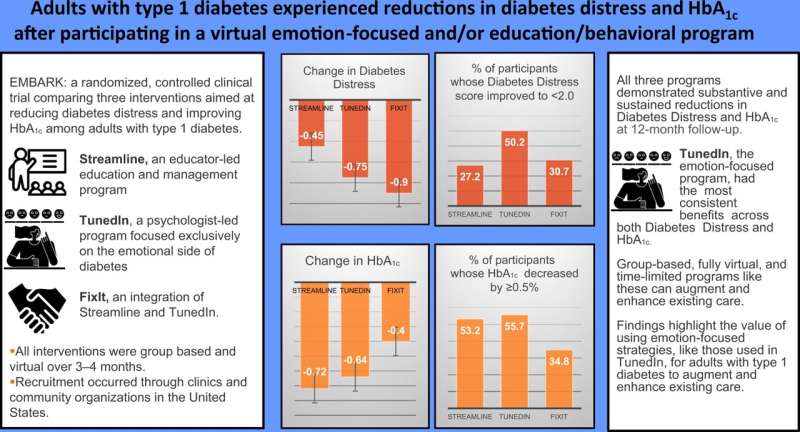This article has been reviewed according to Science X's editorial process and policies. Editors have highlighted the following attributes while ensuring the content's credibility:
fact-checked
peer-reviewed publication
trusted source
proofread
For type 1 diabetes distress, researchers say focus first on managing emotions

The most effective way to reduce the distress that comes with having diabetes—and improve glucose control—is to focus on managing the emotional strain of living with the condition, a new study of adults that was led by researchers at UC San Francisco has found.
Diabetes distress, or DD, refers to the fears, worries and burdens associated with living with and managing diabetes, and it affects up to 75% of adults with type 1 diabetes. It is linked with poor self-management, such as missing medication doses, elevated glucose levels, more incidents of low blood glucose (hypoglycemia) and lower quality of life.
The recent study, published in Diabetes Care, compared three group programs, all of which were delivered virtually. The first focused on education about and management of diabetes, the second on the emotional side of living with diabetes, and the third combined the two approaches.
All three programs yielded significant and clinically meaningful reductions in diabetes distress and hemoglobin A1C, which measures glucose control. But the emotion-focused program, called TunedIn, displayed the most consistent benefits and was far more effective at lowering DD than any other intervention that has been studied.
"Most patients with diabetes have never heard of diabetes distress or been asked about it, and don't understand that it can be alleviated," said first author Danielle Hessler Jones, Ph.D., professor and vice chair for research in the UCSF Department of Faculty and Community Medicine. "Knowing virtual group-based programs are effective presents an opportunity to change that."
Improving access to care
Two hundred and seventy-six adults with type 1 diabetes and elevated diabetes distress participated in the study conducted from 2019–2022. Participants were randomly assigned to one of the three programs, each of which involved a series of virtual meetings over a 3- to 4-month period and included group workshops, group calls and a one-to-one call with the instructor.
Half the study participants no longer had diabetes distress after using TunedIn for one year, compared to 27% of those who used the education-focused program and 31% who used the combination program. TunedIn also had the highest percentage of participants (56%) whose A1C declined by 0.5% or more, which is clinically and statistically significant.
TunedIn incorporates elements and strategies of Acceptance and Commitment Therapy (ACT), which fosters awareness of how painful emotions and beliefs can drive behavior that conflicts with diabetes management. In previous research, ACT strategies have proven effective across a range of chronic diseases and other stress-related settings.
"Providing individuals with type 1 diabetes with opportunities to recognize and observe these processes, and to 'stand beside them,' may enable them to make different choices, choices that can have positive impacts on their health and well-being," Jones said.
Based on this research, the UCSF Diabetes Center has begun to integrate diabetes distress screening into its practice.
"If you don't address the emotional part of living with the illness, you don't do well," said co-author Umesh Masharani, MBBS, a UCSF professor of endocrinology. "It's important that clinicians are trained on how to have these conversations with their patients with diabetes as part of normal care."
TunedIn could broaden access for patients nationwide, and potentially worldwide, who are unable to book treatment with clinical experts in diabetes distress, added Jones. The research team's work has gained international attention through the leadership of co-author Lawrence Fisher, Ph.D., ABPP, professor emeritus at UCSF and director of the Behavioral Diabetes Research Group. Fisher is currently working with colleagues on implementing DD programs in the UK and Europe.
"With so few mental health specialists and psychologists trained in diabetes, virtual programs are really needed to be able to bring this type of evidence-based treatment to patients who can't come to us," Jones said.
More information: Danielle M. Hessler et al, EMBARK: A Randomized, Controlled Trial Comparing Three Approaches to Reducing Diabetes Distress and Improving HbA1c in Adults With Type 1 Diabetes, Diabetes Care (2024). DOI: 10.2337/dc23-2452





















